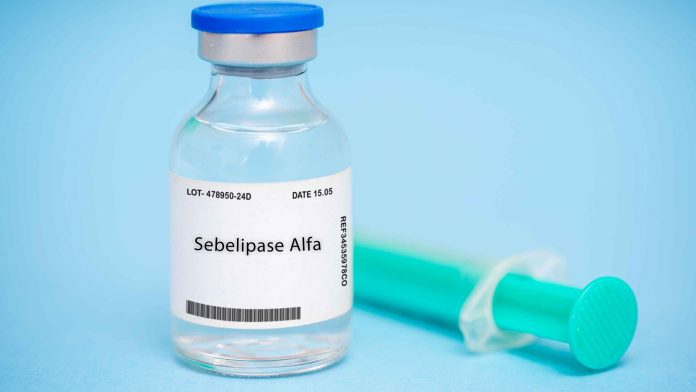
The NHS has approved a life-saving treatment for babies and toddlers grappling with a rare and fatal genetic condition known as Wolman disease.
This marks a pivotal moment as Sebelipase alfa (Kanuma®), an enzyme replacement therapy, becomes the inaugural treatment available on the NHS for Wolman disease, which affects infants under two years old.
The initiative follows a commercial agreement orchestrated by NHS England, leading to the recommendation of Sebelipase alfa for use in the NHS by the National Institute for Health and Care Excellence (NICE) in its final draft guidance released on November 27.
The development is the latest in a series of NHS treatment breakthroughs, after recently approving the use of ranibizumab – a revolutionary drug that can prevent blindness in premature babies.
Commenting on the development, John Stewart, National Director for Specialised Commissioning, NHS England, said: “It’s fantastic news that babies born with Wolman disease will be able to benefit from this life-saving treatment on the NHS from today.
“This is just the latest example of patients benefiting from innovative medicines secured through NHS commercial deals, following shortly after a new five-year medicines agreement was reached with the pharmaceutical industry that will enable rapid patient access to the treatments of tomorrow.”
What is Wolman disease?
Wolman disease, a variant of lysosomal acid lipase deficiency, manifests as a swiftly advancing and life-threatening genetic condition causing extensive damage across multiple organs.
Its occurrence rate stands at approximately 1 in 350,000 births, triggering an accumulation of fat in cells within vital organs such as the liver, heart, blood vessels, and digestive system.

The symptoms are distressing, encompassing enlarged liver and spleen, inadequate weight gain, diminished muscle tone, jaundice, vomiting, diarrhoea, developmental delays, anaemia, and malabsorption.
Traditional treatment interventions are inadequate
Prior to this milestone approval, treatment options for Wolman disease within the NHS were virtually nonexistent.
Standard care offered palliative measures, merely addressing symptoms. Tragically, infants diagnosed with Wolman disease typically didn’t survive beyond their first year without intervention.
Sebelipase alfa will transform Wolman disease care
Sebelipase alfa operates as an enzyme replacement therapy, rectifying the absence of a crucial enzyme within the body, complemented by a regulated, low-fat diet.
The treatment protocol involves weekly intravenous infusions conveniently administered at home. In certain cases, patients might undergo a blood and marrow/stem cell transplant in conjunction with the enzyme replacement therapy.
In the wake of this landmark recommendation, the life-saving treatment will promptly be accessible to eligible patients, facilitated through NHS England’s Innovative Medicines Fund (IMF).
Success stories
A testament to the transformative impact of Sebelipase alfa is the story of Hashir Nawaz, an eight-year-old from Sheffield, South Yorkshire, diagnosed with Wolman disease at the age of three months.
Hashir commenced Sebelipase alfa treatment in January 2016, initially participating in a clinical trial at the Royal Manchester Children’s Hospital and subsequently accessing the therapy via a compassionate access scheme. His treatment regimen involves sessions once every two weeks.
Hashir’s father, Jabran, expresses profound gratitude, acknowledging that without Sebelipase alfa, Hashir’s survival would have been improbable.
Jabran said: “Without Sebelipase alfa, Hashir would not be alive today. Thanks to the treatment, Hashir turned eight last month and is able to live a normal life – going to school full-time, meeting friends on the weekend, and enjoying holidays abroad, including Disneyland.
“This medicine has made a huge difference to our lives, and we are incredibly grateful to the clinicians and the hospital for Hashir’s treatment.”
Statistics estimate that approximately one or two babies born in England each year will grapple with Wolman disease, an inherited recessive condition arising from mutations in a gene.
Clinical trials have demonstrated the treatment’s efficacy in extending life expectancy and enhancing the quality of life for patients.
Manufactured by Alexion, AstraZeneca Rare Disease, the therapy will be administered through specialized services at Manchester University NHS Foundation Trust, Birmingham Women’s and Children’s Hospital, and Great Ormond Street Hospital.
This groundbreaking approval signifies a beacon of hope for families confronting the challenges of Wolman disease, promising a brighter future for affected infants and toddlers.

























